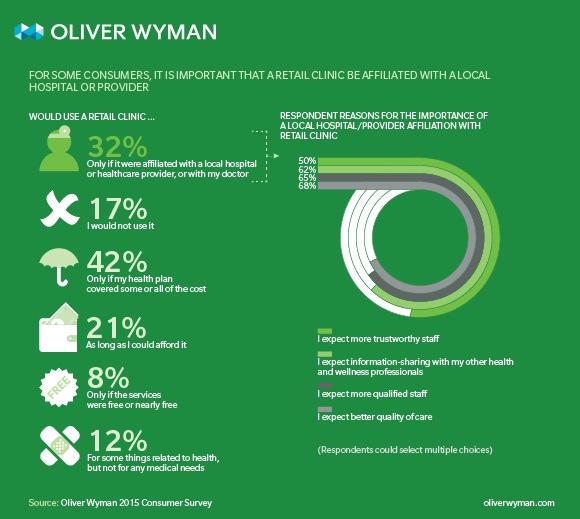According to a new Oliver Wyman survey, consumers’ familiarity and use of alternative sites of care, such as retail clinics, are on the rise. More than that, consumers who have used these “new front door” alternatives seem to like them, as they say they are willing to use them again. In fact, people who had new front door experience said they would be less willing to visit a traditional doctor’s office again. Are providers getting locked out of the new front door? Hardly, says Oliver Wyman Partner Dan Shellenbarger. Here, he presents five keys to the new front door for providers:
Our survey found that consumers value a provider-hospital affiliation, presenting providers with a tremendous growth opportunity. But with the arrival of the new front door, the healthcare experience is about to undergo step-wise improvement for the consumer.
Provider organizations should view this as the beginning of a fundamental reset in consumer expectations. Smart systems will leverage this to improve the patient experience, but also to greatly improve their value proposition to physicians and their care teams – helping them reset patient care and feel greater impact on the health and well-being of their patients.
The implications for incumbent providers cannot be understated. Consider:
1) The new front door is a growth vehicle for providers. It will allow them to reach new patients (both consumers who currently do not have a relationship with a provider and those who have a relationship with another provider) by offering new access options.
Market meaning: There are tremendous implications for systems’ ambulatory footprint. Some existing assets, such as a market-blanketing primary care footprint, may no longer be needed; and some systems will identify asset gaps. The new front door may provide an efficient vehicle to increase a provider’s number of attributable and managed lives. So getting the footprint right will become increasingly important as more providers transition to value.
2) Connecting the new front door back to core medical homes will render a fully new experience, resetting consumer expectations.
Market meaning: Physicians and care teams must be ready to receive and operate in this environment. Performance metrics, compensation, and incentives will need to shift.
3) Providers have the chance to create a better experience for everybody – patients, physicians, and the care team – by enabling a seamless care experience.
Market meaning: Coordinating care is easy to say, hard to do. Systems have to get it right – connecting with and transferring information between the various new front door access points in order to create a truly integrated experience. Traditional health system thinking will be an encumbrance here; systems must start with consumers’ needs and hassles in mind.
4) Providers wield a tremendous advantage in that they already have consumers’ trust. (Some consumers say they would use retail care only if it were affiliated with a local hospital or provider.)
Market meaning: In order to capitalize on that legacy brand-position, providers must move quickly and determine how they will monetize the brand + quality + trust advantage. As they do, they must recognize they are now operating in an arena driven by consumer expectations; what might have passed for customer service in the traditional arena won’t fly in the new, consumer-centric front door.
5) Expansion to virtual channels will allow systems to unlock trapped delivery-system capacity (think Uber), fully resetting patient expectations, and the interaction and engagement model that systems can use to more proactively support patient needs.
Market meaning: Introducing this in a manner that (1) meets with consumer/patient readiness, and (2) that can be effectively resourced (staffed) will be key to creating traction toward a magnetic and impactful experience.




